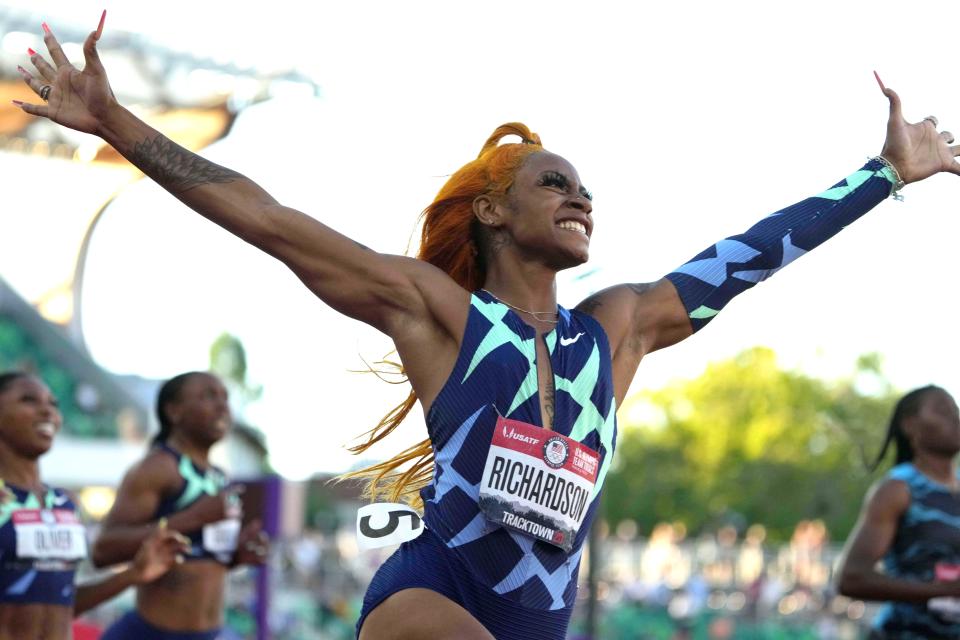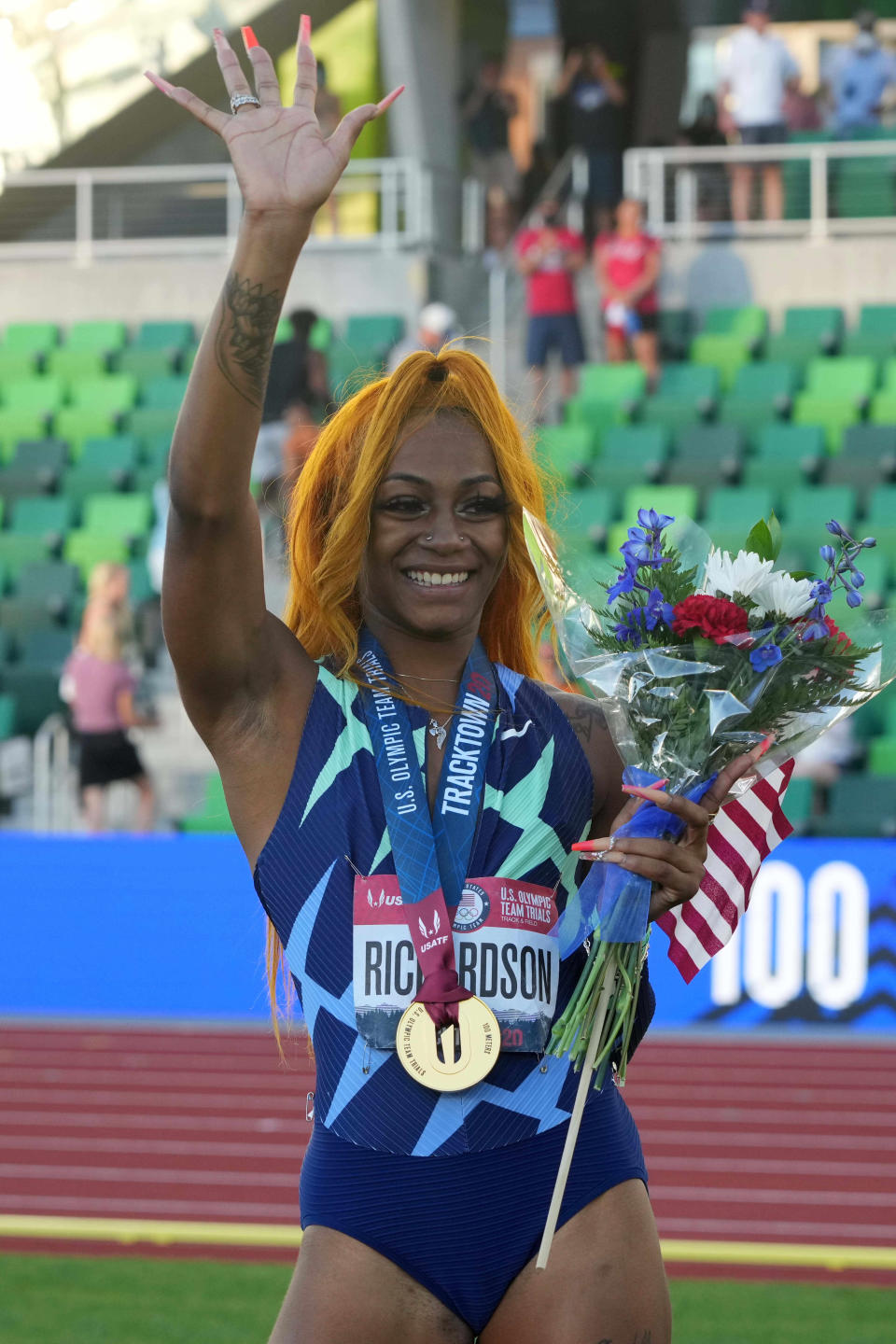Opinion: Sha'Carri Richardson's marijuana ban is another example of Olympic hypocrisy
Adding counter-culture sports isn’t enough to make the three-piece-suit-wearing, five-star-hotel-staying, mostly-white-male Olympic officials hip, cool or remotely in tune with current norms.
Just how removed from reality they are was brought into sharp focus – again – on Friday, when U.S. sprinter Sha’Carri Richardson accepted a one-month “doping” suspension that will keep her out of the 100 meters at the Tokyo Olympics. The big, bad drug that Richardson got busted for? Marijuana.
That’s right. Pot.
A “drug” that is becoming so socially acceptable it is now fully legal in 18 states, including Oregon, where Richardson tested positive, and Canada, and decriminalized in an additional 12 states. A “drug” that also is allowed, at least for medical use, in Mexico and Australia, as well as several countries in Europe, South America and Asia. A “drug” that “does not enhance aerobic exercise or strength,” according to a 2017 review by the Journal of Science and Medicine in Sport.
A “drug” that no longer has any business being on the World Anti-Doping Agency’s list of banned substances. If it ever did.
Richardson said on the TODAY show that she used marijuana after being surprised with the news that her biological mother had died.
“It definitely triggered (me),” she said. “From there, just blinded by emotions, blinded by badness, blinded by just hurting. Hiding hurt, honestly. I know I can’t hide myself, so at least in some type of way, I’ll just try to hide my pain.”

And therein lies the hypocrisy of this.
Had Richardson competed after shotgunning a six-pack or getting black-out drunk, there wouldn’t have been a problem because, as of 2018, alcohol is not on the World Anti-Doping Agency’s list of prohibited substances. Yet marijuana, which is used in much the same way, is.
This isn't a U.S. Anti-Doping Agency rule, mind you. But as signatories to the WADA code, USADA has no choice but to enforce the rules it is given.
"Many now support it being off the list since this should be about performance-enhancing substances and given that it’s widely available in certain countries, but many also agree from a health and safety standpoint it should remain on the list to prohibit injuries during competition," Travis Tygart, CEO of USADA, told USA TODAY Sports.
“We don’t want a high cyclist speeding at 70 mph in a group of other cyclists down a mountain in the Tour de France and I don’t think anyone wants a stoned snowboarder risking injuries on a half pipe at the Olympics,” Tygart said. “It also can dull pain so in certain sports it can increase the likelihood of injury.
“But no one for a second thinks an amount of marijuana in a swimmer or sprinter is going to necessarily cause that injury.”
MORE: Eight key takeaways from the U.S. Olympic track and field trials
ANALYSIS: Analysis: Olympic trials show the United States has its sprinting swagger back
This is not to condone the overuse or abuse of either alcohol or marijuana. But if WADA is so concerned about athletes harming themselves or others if they compete while high, then why isn’t alcohol seen as equally dangerous? Because the potential ramifications are the same.
Prohibiting athletes from using one but not the other reflects an antiquated attitude that people who smoke pot are all glassy-eyed losers toking up in their basements when, in reality, they are doctors, lawyers, business professionals and, yes, elite athletes. Just like the people who consume alcohol.

But the Olympic movement remains a stodgy bunch, even as it has added sports like snowboarding, freestyle skiing, BMX and, in Tokyo, skateboarding and surfing. It wants to co-opt the edginess and cool factor of these sports that appeal to younger people while continuing to look down its nose at the culture that surrounds them and contributes to their popularity.
Eventually, however, even Olympic officials are going to have to acknowledge reality. Just as the NFL and NBA did.
Not only is the NFL no longer suspending players who test positive for marijuana, it is funding research into its use for pain management. The NBA has stopped doing random testing for marijuana.
At some point, and Richardson’s case makes it even more likely that it’s sooner rather than later, WADA will admit that policing people for pot use is a waste of its time and resources, particularly when there are actual dopers to catch and punish.
Like say, oh I don't know, countries that have made a fool out of the anti-doping movement with their state-sponsored doping programs. But I digress.
“It wouldn't be going out on a limb to say one of these days, it's just going to be dropped off the list and WADA's going to say 'Why are we bothering with this?' ” said Roger Pielke, a professor at the University of Colorado who studies sports governance. “But we're not there yet."
Which means Richardson will wind up taking the fall for a nonsensical rule that will eventually cease to exist. That's no consolation to an athlete who has a small window to be at the top of her sport, and an even smaller window to win its biggest prize.
Follow USA TODAY Sports columnist Nancy Armour on Twitter @nrarmour.
This article originally appeared on USA TODAY: Sha'Carri Richardson's Olympic marijuana ban an example of hypocrisy

